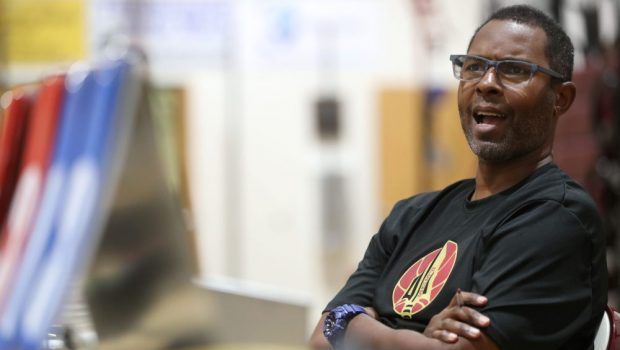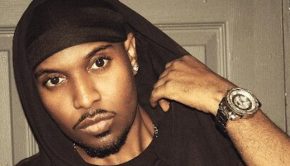Florida State Legend/Heisman Trophy Winner and Former NY Knicks Point Guard, Charlie Ward Grateful to See Stature Not Matter!
Charlie Ward has competed at the highest level in both collegiate football and the NBA. He won a national title in 1994 as the Florida State Seminoles quarterback and competed in the NBA Finals in 1999 with the New York Knicks.
Charlie Ward has been on quite the athletic journey. Ward captured both the Heisman Trophy and Davey O’Brien Award (Presented to the best college quarterback) while serving as the Florida State Seminoles signal caller from 1990-1994. He would also capture a National Championship during that time as well. However, he became one of the very few players to win the Heisman and not be drafted into the NFL. Fortunately for Ward, he never gave up playing basketball while at Florida State and in 1994, the New York Knicks selected him 26th overall in the 1st round of the NBA draft. He played for the Knicks for 9-seasons and reached the NBA Finals in 1999 before coming up short against the San Antonio Spurs. After a few short stints with the Spurs and Rockets, injuries forced, Ward to retire from the league. He transitioned into coaching and became an assistant with the Houston Rockets, but would later fulfill his goal to work with the youth as he became and still is coaching in the high school ranks. In 2006, he was inducted into the College Football Hall of Fame.
I had a chance to speak with, Charlie Ward who talks about working with the youth, as well as the changes he sees in both college and pro football and the NBA.
It’s an honor speaking to you. I have been a fan for a long time.
Charlie Ward: Oh, thank you!
You excelled at a very high level being a two-sport athlete. There has been a lot of debate about this topic. As a high school basketball coach now, do you encourage kids to play more than one sport or do you feel like they should find one sport and give that one sport their all?
Charlie Ward: I’ve changed my views a little bit on it. I’m all about options and giving yourself options. First thing you gotta have are your grades, that’s the first options and then the second thing, if you’re athletic and you have any sort of athletic bone, then you should play multiple sports because you never know which sport is going to give you the opportunity to go to school for free. I’ve shared with parents; you should play at least two sports if you’re going to be a multi-sport athlete. If you play more than two then you are spreading yourself thin. And what I mean by spreading yourself thin, you won’t be able to be good at any. You can be okay, but you won’t be able to excel if you’re playing three sports. There are a handful of guys and girls that may be able to do it, but those are what you call your raw talent; the Deion Sanders and Bo Jackson’s. You have guys who can just roll out of bed and they are just good because they are great athletes. They can play multiple sports at the high level. But I always tell the kids at least play two sports. But I also got to the point where, if you’re trying to excel and you’re behind from a talent standpoint, if you need to focus on one sport, then you should do that.
I’m just not a big believer in doing that as a middle schooler or even as a freshman. I think once you get into 10th grade on if you want to focus on one sport, I understand it. But when you’re young, you really don’t know. You’re using the same muscles over and over and by the time you become a senior you may be burnt out. It’s always about timing and everyone is different, but I believe if you’re going to play one sport, it should be from your sophomore year of high school forward. Then you can say, “I’m going to focus on track. My first two years, I did really well in track and if I focus on it a little bit more, I can get to a level to earn myself a scholarship.” That goes for any sport. But if you can do multiple sports, it’s the best way because you give yourself options. My situation in high school, I wanted to give myself options, but I also just enjoyed playing sports. I was an athlete.
You have had offers to coach at the college and pro ranks and you have, but it seems like you find more joy in molding young minds and developing that talent as a teenager. Is that your goal, to influence some of these younger minds before they get set in their ways?
Charlie Ward: That was the thought process of going to high school. When I left the NBA as a coach, I wanted to go to high school because for one, it was a flexible schedule opposed to the NBA or collegiate level. And secondly, I wanted to be able to share my experiences that I have had over my career with younger kids. To be able to help them think through situations that some of my coaches talked to me about when I was growing up. And also, what to expect once you get to the next level. Whether it’s college or pros, if that’s your desire. Also, just learning life skills through sports. We all can’t play sports the rest of our lives and at some point in time we have to learn life skills. So, just teaching them life skills and how to cope, how to be coachable, how to be responsible and being accountable for the things that you’re doing. You’re part of a team and all of this stuff goes across the board.
When you’re a husband, you gotta learn how to be coachable. Your wife is going to coach you up on some things, so you gotta learn and be flexible. Be a good teammate. What does that look like? I just try to teach our guys these life lessons that they are going to look back on one day and say, “I remember when coach sat me down because I was late.” You treat everyone the same when it comes to discipline. You break the rules… the rules are the rules. That has definitely cost me some games, but like my daddy said, “I can win with you I can win without you.” I have done both (laughing). You learn a lesson.
You were also involved with a father-son sleep in used for bonding and building those relationships. We see so often at these games where it’s just the mom out there supporting or the grandparents. How important at the level you’re at or any level to have father’s or a father figure in these young athletes’ lives?
Charlie Ward: It’s not even about sports; just in general with fathers. It all goes back to the beginning when God and Adam had a relationship. That was the first father-son type of bond that God created. When that dynamic is not in sync there is a missing piece, it’s a normal and natural occurrence that happens when the father is not involved. But there are people who step up and become father figures to the kids who don’t have dads. But there are also a lot of kids who fall through the cracks because they may not have the right mentors in their lives. They may see a different side of what we may consider a father that pleases God looks like. That’s what they grow up seeing. There are things that are innate that we learn from our fathers. With my dad being in the house, there are some things that he did that I repeated, and I even talked to him about it; just innate things that happened. That’s just the way life is, so if the dad is not there, that’s what the sons see, you’re not around, so they hear the mom talking about the dad or complaining or whatever the case may be and that’s who they end of modeling themselves after. As much as they don’t want to, it’s innate and it’s just part of them until someone teaches them something different or they have a relationship with the Lord and see, this is the way their supposed to live their life. I have a blueprint on what that looks like and until that happens, we are just going to go with what we know or what we’ve seen. Me being a father… my wife brings something totally different to the table. And if one is missing, then we’re missing out on one aspect of what the kid needs.
I spoke to former Tulane and Tampa Bay Buccaneers quarterback, Shaun King and I asked him who was his idol coming up. He said it was you because, not only did they not have many black quarterbacks at the time to idolize, but he could relate to the 6’1-6’2 stature and all of the things that came along with that. Did you ever think you would see a time where not only are shorter quarterbacks being selected in the NFL, but they are selected top of the draft and teams are basing their offenses around their skill sets?
Charlie Ward: I appreciate him saying that. It’s all just a change of the times. Back when I was growing up, they didn’t have cell phones. Then when the cell phones came out, they were huge. We had pagers and we still had to use the pay phones. Over the course of time, now we have cell phones and technology and a lot of things have changed and I think that’s just the way life is. Hopefully, things don’t stay the same. You see something that works, and it really only takes one person to kind of help change the mode and the mindset of someone. The game has evolved to where in college, they are doing a lot of different things that are successful. And the quarterbacks who are smaller have a better opportunity in the NFL as we have seen over the last 2-years. Two quarterbacks that are 6’0 or 6’1 became the first overall pick. During my time that was not even happening even if you weren’t black. It didn’t matter. You had to be a certain height and stature and that was just the mindset. We understood it and got in where you fit in and you didn’t try to buck the system. In this day and age, I’m glad that these guys get an opportunity to realize their dreams of playing in the NFL without having to meet a certain quota as far as height is concerned.
It’s also a certain style of offense now. Back then you had to be underneath the center all the time to be able to play. If you couldn’t do that then they felt like you couldn’t be an NFL quarterback. The more I got into it I never understood why the offense was so difficult to try to understand. In high school and college, you put a system together and you kind of understand it over the course of time. But some of these offenses in the NFL, it’s just so many words that you’re telling guys who don’t have any other jobs outside of playing their sport. You’re telling them what to do on every play; “X-this, Y-this, X-this,” and all these different things and I’m just like, call something a code and run with it. And that’s what a lot of these spread offenses are doing, and guys are able to play faster without having to think all of the time. That’s just part of it. Times have changed and I’m just grateful that times have changed and giving more guys the opportunity to realize their goals of being an NFL draft pick in the first round at 6’0 as a quarterback; whether you black or white or whatever.
Speaking of things changing, you played in a very different NBA. The center position as being a presence down low is pretty much gone and everything seems to evolve around the 3-point line. What are your thoughts on today’s NBA?
Charlie Ward: Again, times have changed. The 3-point line is… people are shooting the 3-point shot more and making them because scores are going up. They also eliminated a lot of the physical play. It’s about freedom of moment now, at least until you get to the playoffs and Finals. Then they seem to throw that out the window a little bit. But the freedom of movement has definitely opened up the game even more and of course the guys are different. The athletes that are coming through now are different and that’s football and basketball and baseball; all sports. These athletes are different because training has started a little bit earlier. Guys are growing and they are stronger and bigger and that changes a lot of things. We played physical and played hard and what have you. We had freakish athletes as well that played during our time, but now it’s like, if you aren’t in that mode, then you kind of get left behind. That definitely opened up the 3-point line. You have more guys that are shooters. If you are a great shooter, you have a better opportunity to make a team now because they value the 3-point shot.
You were the rare, 4-year player and chose to play basketball your senior year when most thought you should focus more on football and the draft. Now, we see guys sitting out of Bowl games as well as some guys taking games off in pro sports to rest their bodies. How do you view guys doing this?
Charlie Ward: I wouldn’t do it; me personally. To each is own, you look at [Kevin] Durant situation and Kawhi [Leonard] just a year ago sitting out pretty much an entire season because he felt like he wasn’t ready. His situation worked out. I think he still has some issues that he’s dealing with, with that quad as we speak. But everyone has to make a decision that they feel is best for them. Even though some feel like, they couldn’t sit out of a Bowl game even if it’s not a meaningful game. They just want to play because they have been there with their teammates and what have you, but there have also been guys who got injured in Bowl games. That cut their NFL career short and hurt their draft status. And then there are some that have gone on to play in Bowl games and upped their stock a little bit because of a great Bowl game that they played. It’s a hit or miss deal.
You just have to follow your heart, always give your best and get the right team and people you feel comfortable with; make a decision and live with it. We make decisions and we have to live with whatever decisions we make and sometimes in sports it’s not going to always be the best. I’ve seen kids who get injured during the combine and during training. It’s not an exact science. Just because I skip the Bowl game I’m not going to get hurt. Everyone shouldn’t work that way or think that way because if it’s going to happen it’s going to happen. You just have to continue to do what you feel is best and not make it a physical deal. My whole thought process was, I could have easily come out of college, easily given up my basketball career my senior year and tried to focus on the NFL. But I chose to continue to play basketball in college and have options and that was by choice. I chose to play college basketball my senior year so I could have options. I knew if I was to give up that option, then I was going to be pigeonholed into being an NFL player and doing what they wanted me to do and getting drafted where they felt I should get drafted. So, that was my choice. Some thought it was crazy because I was a Heisman Trophy winner and played football at a high level and basketball wise, I was a great role player and I had great upside, but no one probably at the time didn’t see me as a first- round draft pick. But when you make a decision, I believe you put work behind it and God honors all of those things and I was blessed to be able to make it work. That was the result, but if I wouldn’t have gotten drafted in the NBA, I would have had to make some other decisions. I was blessed to be able to have options. I worked both systems. One didn’t give me the opportunity to have a job and the other one did.
By Percy Crawford































